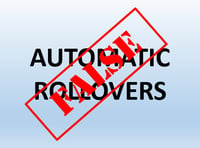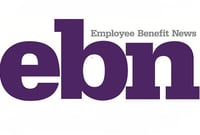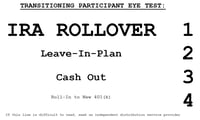Consolidation Corner
-
Blog
- 401k Cash Outs
- 401k Consolidation
- 401k Plan Termination
- America's Mobile Workforce
- Assisted Roll-in
- Auto Enrollment
- Auto Portability
- Auto Portability Simulation
- Automatic Roll-In
- Automatic Rollover
- Automatic Rollovers
- Boston Research Technologies
- CARES act
- Common Mistakes
- DIY Roll-In
- DOL Advisory Opinion
- EBRI
- Employee Benefit News
- ERISA Advisory Council
- Financial Services Roundtable
- Financial Wellness
- How-To
- In-Plan Consolidation
- Leakage
- Lifetime Plan Participation
- Lost Participants
- Managed Portability
- Mandatory Distributions
- MarketWatch
- Missing Participant IRA
- Missing Participants
- National Retirement Savings Cash Out Clock
- Participant Transition Management
- PLANSPONSOR
- Portability Services Network
- PSCA
- Public Policy
- RCH Services
- Retirement Income
- Retirement Plan Portability
- retirement research
- Retirement Savings Consolidation
- Retirement Savings Portability
- Roll-In
- Safe Harbor IRA
- Saver's Match
- Security
- Small Accounts
- Stale Dated Checks
- Synthetic Tenure
- Uncashed Check Services
- Uncashed Distribution Checks
- Video
- Webcast
- What is a Missing Participant?
Auto Portability (24)
Consolidation Corner Blog
Consolidation Corner is the Retirement Clearinghouse (RCH) blog, and features the latest articles and bylines from our executives, addressing important retirement savings portability topics.
Say What? The Arcane Lingo of Retirement Savings Portability

In virtually any area of specialty, a unique jargon evolves that’s highly-specific to that field. To insiders using the lingo every day, it seems familiar and perfectly normal. To outside observers, it can feel like a foreign language -- with words, terms and acronyms that make no sense.
For Earth Day: Consider How "Recycling" Could Apply to Our Retirement System

As we observe the 46th annual Earth Day this April 22nd, we appreciate the awareness that this event has brought to the need to protect our environment, the urgency that it’s instilled in all of us, and the tangible results that have been achieved in so many important areas. Although we have much work to do, we’ve clearly come a long way since the “throwaway” culture that emerged following World War II.
Five Common Misconceptions About Automatic Rollovers

Automatic rollover programs allow plan sponsors to force out of their plan separated participants with balances less than $5,000 into a Safe Harbor IRA. These programs can be quite effective at helping sponsors resolve many of the problems associated with housing small-balance accounts in-plan, such as:
Account consolidation time-consuming, expensive for employees
 As has happened so many times before, the Baby Boomer generation is once again drawing attention to an unmet need: a seamless way to consolidate their collection of retirement accounts into a single account, which is a necessary step to creating a sturdy retirement plan. Much has been written about how sponsors can improve both their plans’ overall health and their participants’ retirement outcomes by embracing roll-ins; nonetheless, the account-consolidation process remains time-consuming and expensive for most participants.
As has happened so many times before, the Baby Boomer generation is once again drawing attention to an unmet need: a seamless way to consolidate their collection of retirement accounts into a single account, which is a necessary step to creating a sturdy retirement plan. Much has been written about how sponsors can improve both their plans’ overall health and their participants’ retirement outcomes by embracing roll-ins; nonetheless, the account-consolidation process remains time-consuming and expensive for most participants.
The Fiduciary Rule and Participant Transition Management
 Any day now, the Department of Labor will issue the final version of the long-awaited “Fiduciary Rule” which will redefine the term “fiduciary” under ERISA. Much has been written about the impact on advisors and broker-dealers, given their service models to retirement plans.
Any day now, the Department of Labor will issue the final version of the long-awaited “Fiduciary Rule” which will redefine the term “fiduciary” under ERISA. Much has been written about the impact on advisors and broker-dealers, given their service models to retirement plans.
Small Balance Cash-Outs: The Easy Choice Isn’t The Right One
 In a previous blog post, we asked, “Why dump mandatory distributions in a landfill when you can recycle?” As we wrote then, sponsors exercising their authority to automatically roll over separated participants’ small balances into safe harbor IRAs—without encouraging participants to take their retirement account savings with them at the point of job change, or facilitating “auto portability” to make plan-to-plan asset transfers a seamless process—are doing themselves and their participants a disservice in the long run.
In a previous blog post, we asked, “Why dump mandatory distributions in a landfill when you can recycle?” As we wrote then, sponsors exercising their authority to automatically roll over separated participants’ small balances into safe harbor IRAs—without encouraging participants to take their retirement account savings with them at the point of job change, or facilitating “auto portability” to make plan-to-plan asset transfers a seamless process—are doing themselves and their participants a disservice in the long run.
Cutting the Gordian Knot: Portability & Small Accounts
 Have you ever wondered why so few participants move their old 401(k)s into their current employers’ plans? Or why so many participants prematurely cash out their retirement savings accounts, regardless of taxes and penalties? Or why job-changing participants leave their savings behind only to lose track of them—as if their assets for retirement belong on some remote desert island away from all their other savings?
Have you ever wondered why so few participants move their old 401(k)s into their current employers’ plans? Or why so many participants prematurely cash out their retirement savings accounts, regardless of taxes and penalties? Or why job-changing participants leave their savings behind only to lose track of them—as if their assets for retirement belong on some remote desert island away from all their other savings?
Washington Recognizes Need for Retirement Plan Portability Solutions
Clearly, Washington DC is now “getting it” when it comes to retirement plan portability.
In November 2015, Senator Patty Murray and other influential members of Congress delivered a letter to Department of Labor Secretary Perez urging action on Auto Portability. Now, we have strong comments from President Obama in his final State Of The Union address on the need for more portable retirement savings.
Auto Enrollment: The Unintended Consequences, Part II
In his December 1, 2015 article (The unintended consequence of 401(k) auto-enrollment), RCH CEO Spencer Williams exposes the linkage between auto enrollment and lower average account balances. Based on Form 5500 data, Williams’ analysis presents some excellent examples of industries where average balances are significantly lower in plans that have adopted auto enrollment compared to plans that haven’t.
The checklist you need to manage multiple retirement accounts
 In his December 16th, 2015 article in MarketWatch, RCH’s CEO Spencer Williams offers a year-end checklist for those retirement savers who’ve elected to leave qualified retirement savings accounts behind with their former employers.
In his December 16th, 2015 article in MarketWatch, RCH’s CEO Spencer Williams offers a year-end checklist for those retirement savers who’ve elected to leave qualified retirement savings accounts behind with their former employers.
-
Blog
- 401k Cash Outs
- 401k Consolidation
- 401k Plan Termination
- America's Mobile Workforce
- Assisted Roll-in
- Auto Enrollment
- Auto Portability
- Auto Portability Simulation
- Automatic Roll-In
- Automatic Rollover
- Automatic Rollovers
- Boston Research Technologies
- CARES act
- Common Mistakes
- DIY Roll-In
- DOL Advisory Opinion
- EBRI
- Employee Benefit News
- ERISA Advisory Council
- Financial Services Roundtable
- Financial Wellness
- How-To
- In-Plan Consolidation
- Leakage
- Lifetime Plan Participation
- Lost Participants
- Managed Portability
- Mandatory Distributions
- MarketWatch
- Missing Participant IRA
- Missing Participants
- National Retirement Savings Cash Out Clock
- Participant Transition Management
- PLANSPONSOR
- Portability Services Network
- PSCA
- Public Policy
- RCH Services
- Retirement Income
- Retirement Plan Portability
- retirement research
- Retirement Savings Consolidation
- Retirement Savings Portability
- Roll-In
- Safe Harbor IRA
- Saver's Match
- Security
- Small Accounts
- Stale Dated Checks
- Synthetic Tenure
- Uncashed Check Services
- Uncashed Distribution Checks
- Video
- Webcast
- What is a Missing Participant?
